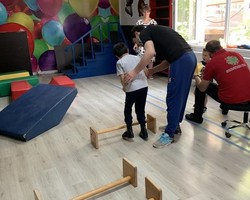Georgia assesses its rehabilitation services

WHO
WHO/Europe is providing support to Georgia in assessing its rehabilitation services. Focusing on how and to what extent rehabilitation is integrated within the health system, the assessment is taking place over 3 weeks from 10–28 February 2020 and provides valuable data on which to build a national rehabilitation strategic plan to improve the services.
Rehabilitation services allow people with limitations in functioning to be able to move around, communicate, and look after themselves independently. This in turn helps to minimize negative social and economic impacts on health, and improves overall quality of life while ensuring no one is left behind.
First step towards a national strategic plan
The assessment – led by the Ministry of Internally Displaced Persons from the Occupied Territories, Labour, Health and Social Affairs, with the support of WHO/Europe – includes interviews, focus groups, site visits and meetings with over 100 stakeholders in the country. Based on WHO’s Rehabilitation in health systems: guide for action, the assessment is the first step in the development of a comprehensive plan in a process which includes 4 phases:
- situation assessment
- strategic planning
- development of monitoring, evaluation and review processes
- implementation of the strategic plan.
Dr Tamar Gabunia, Georgia’s First Deputy Minister who took part in the assessment phase, commented that “access to rehabilitation services is crucial for population health. WHO support to strengthen rehabilitation services in the country is extremely timely and important”.
Region-wide concern
In the WHO European Region, population is ageing and the number of people living with noncommunicable diseases and the consequences of injuries is increasing. Current demographic and health shifts are contributing to a rapid increase in the number of people experiencing disability or a decline in functioning for substantially larger periods of their lives.
WHO/Europe has initiated a 4-year programme (2018–2022) to strengthen access to rehabilitation services and access to assistive products in the Region, and has identified eastern Europe, central Asia and the Caucasus as a geo-political priority – regions which include Georgia. The programme is supported by the United States Agency for International Development (USAID).



